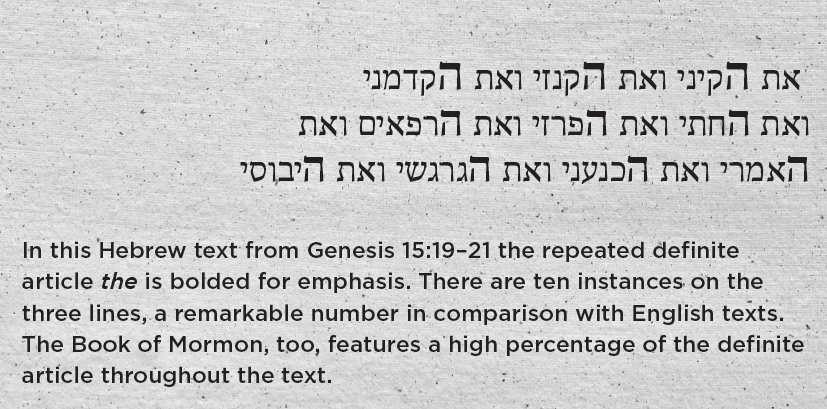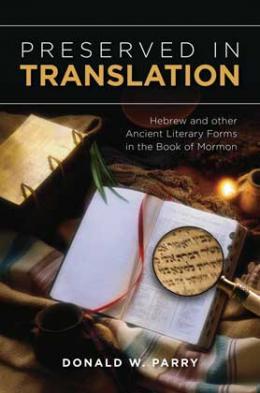Repetition of "The"
Donald W. Perry, “Repetition of The,” in Preserved in Translation: Hebrew and Other Ancient Literary Forms in the Book of Mormon (Provo, UT: Religious Studies Center, Brigham Young University; Salt Lake City: Deseret Book), 67‒68.
"the scarlets, and the fine-twined linen" (1 Nephi 13:8)
A series of nouns in English can be introduced by a single instance of the. By contrast, Biblical Hebrew regularly repeats the definite article for each noun.[1] Instances of repeated the abound in the Old Testament—for example, Genesis 15:19–21: “The Kenites, and the Kenizzites, and the Kadmonites, and the Hittites, and the Perizzites, and the Rephaims, and the Amorites, and the Canaanites, and the Girgashites, and the Jebusites.” Another example comes from Exodus 9:3: “The hand of the Lord is upon thy cattle which is in the field, upon the horses, upon the asses, upon the camels, upon the oxen, and upon the sheep” (Exodus 9:3).

Like its Hebrew Bible counterpart, the Book of Mormon often repeats the article the before each noun in a list:
“We did observe to keep the judgments, and the statutes, and the commandments of the Lord.” (2 Nephi 5:10)
“Behold the gold and the silver, and the silks, and the scarlets, and the fine-twined linen, and the precious clothing, and the harlots.” (1 Nephi 13:8)
“There were beasts in the forests of every kind, both the cow and the ox, and the ass and the horse, and the goat and the wild goat.” (1 Nephi 18:25)
“And thus he went on, taking possession of many cities, the city of Nephihah, and the city of Lehi, and the city of Morianton, and the city of Omner, and the city of Gid, and the city of Mulek.” (Alma 51:26)
Notes
[1] “This use [of the] is much more extensive in Hebrew than in English.” Waltke and O’Connor, Biblical Hebrew Syntax, 244. See their analysis on pp. 242–46.
